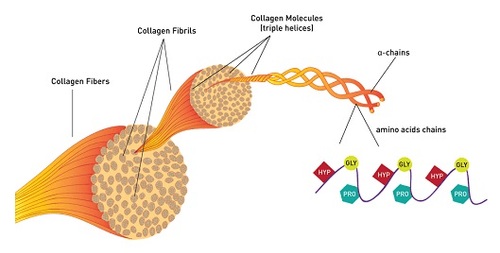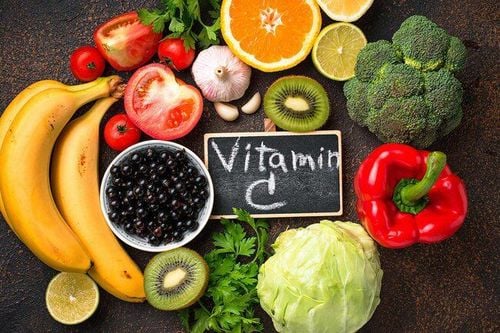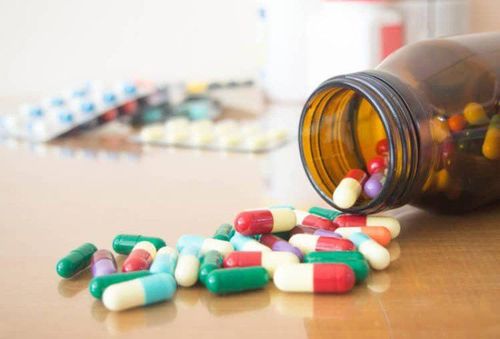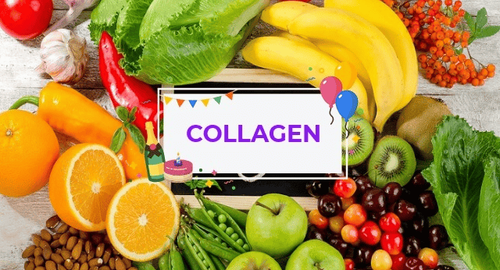This is an automatically translated article.
Collagen has various important roles, including providing structure to the skin and helping with blood clotting. It is often found as an ingredient in shampoos and lotions. However, you may be wondering what collagen is, as well as what it does.
1. What is collagen?
Collagen is one of the important components that help build bones, skin, muscles, tendons and ligaments in the body. In addition, collagen is also found in many other parts of the body such as blood vessels, cornea and teeth. We can think of it as the glue that holds all of this together. There are at least 16 types of collagen with four main types being types I, II, III and IV. These include:
Collagen type I. This type makes up the vast majority of collagen in the body and is made up of dense fibers. Provides structure to skin, bones, tendons, fibrous cartilage, connective tissue and teeth. Type II collagen. This type is found in elastic cartilage, which cushions joints. Type III collagen. Plays a role in supporting the structure of muscles, organs, and arteries. Type IV collagen. This type is found in many layers of the skin. As we age, the body produces less and lower quality collagen. One of the obvious signs is that the skin becomes less firm and soft. Cartilage also weakens with age.

Collagen là một trong thành tố quan trọng giúp xây dựng các khối xương, da, cơ, gân và dây chằng trong cơ thể.
2. Nutrients that help increase collagen production
All collagen starts as procollagen. The body makes procollagen by combining two amino acids, glycine and proline. This process uses vitamin C. You can help your body produce this important protein by getting a variety of nutrients:
Vitamin C. Vitamin C is found in citrus fruits, bell peppers and strawberries. Proline. Proline is found in egg whites, wheat germ, dairy products, and mushrooms. Glycine. Glyxin is abundant in animal skins such as pig skin, chicken skin and various protein foods. Copper. Copper is found in organ meats, sesame seeds, cocoa powder, cashews and lentils. In addition, the body also needs high-quality protein containing the necessary amino acids to make new proteins. They are found in meat, seafood, dairy, legumes and tofu.

Vitamin C giúp cơ thể tạo ra procollagen.
3. Things that damage collagen
Sugar and starch can interfere with collagen's ability to repair itself. Therefore, minimize the consumption of added sugars and starches.
Get too much sun. UV radiation reduces collagen production, so you should limit your exposure to the sun for too long. Smoking also reduces collagen production.
Collagen is found in foods of animal origin. For example, it is found in abundance in chicken skin, pig skin, and bone broth made by boiling the bones of chickens and other animals.

Bức xạ của tia cực tím sẽ giảm sản xuất collagen, vì vậy, bạn nên hạn chế tiếp xúc quá lâu với ánh nắng mặt trời.
4. What are the benefits of drinking collagen?
There are two common types of collagen: hydrolyzed collagen (collagen hydrolysate) and gelatin. Gelatin is a product of collagen after it is cooked. During the cooking process, large proteins have been broken down into smaller peptides that are easier to absorb in the body. There isn't a lot of research on collagen supplements, but the studies that are available show some promise for collagen benefits such as:
Increases muscle mass. A 2019 study in men found that a combination of collagen peptide supplements and strength training increased muscle mass and strength. Prevent arthritis. Animal studies have shown that collagen supplements may play a role in protecting the body from the development and progression of arthritis. Increase skin elasticity. Women who took collagen supplements showed improvements in skin elasticity and appearance in a 2019 study.

Bổ sung collagen có thể mang đến một số lợi ích nhất định.
5. Use collagen
Collagen peptides come in powder form that can be easily incorporated into foods such as smoothies, soups or baked goods without affecting their texture. When considering collagen supplements, you should look for a high-quality source.
Collagen has many uses, from food, medicine to manufacturing. For thousands of years, collagen has been used to make glue. In foods, heated collagen is used to make sausage casings. In the medical field, it is used as a filler in plastic surgery and for the dressing of severe burns.
Collagen provides structure to many parts of the body. Interestingly, many foods and nutrients can help the body make this protein. Additionally, collagen supplements may be beneficial in improving skin quality, muscle function, and reducing osteoarthritis pain.
Please dial HOTLINE for more information or register for an appointment HERE. Download MyVinmec app to make appointments faster and to manage your bookings easily.
Reference source: healthline.com












